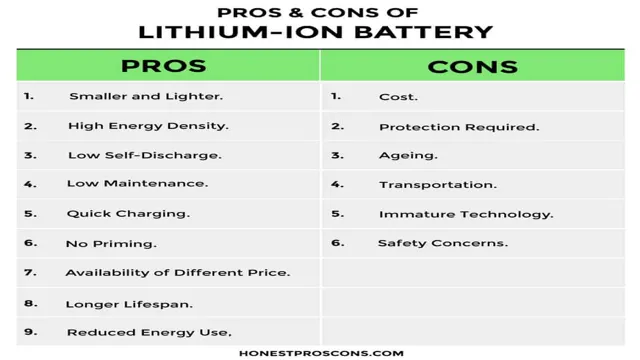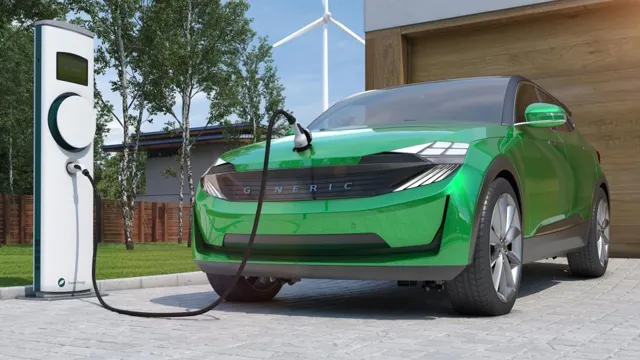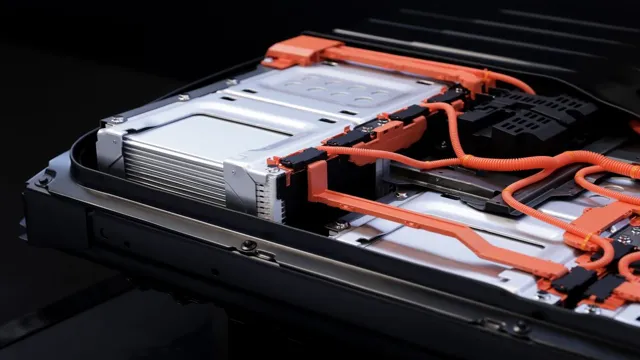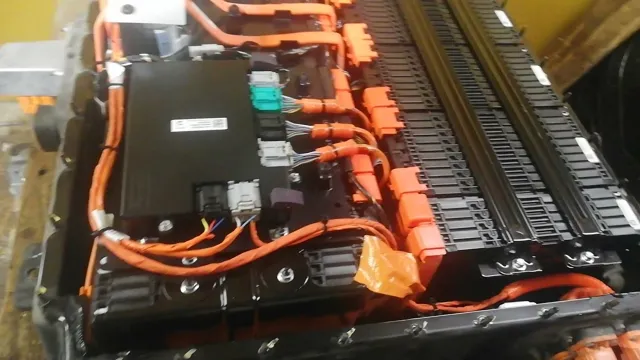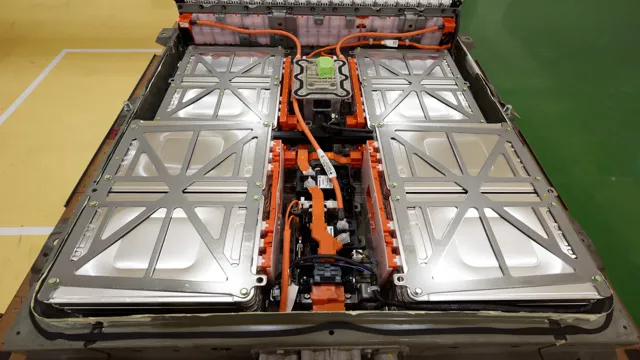Exploring the Dark Side of Electric Cars: Debunking Electric Car Battery Disadvantages
Electric cars are increasingly becoming popular as people look for sustainable solutions to their transportation needs. These vehicles are fuel-efficient and emit fewer greenhouse gases, making them an eco-friendly option. However, like any other technology, electric cars have their disadvantages.
In this blog post, we will discuss the electric car battery’s disadvantages, ranging from limited driving range to the high cost of replacement. We’ll examine the drawbacks that come with the battery technology that powers electric cars and look into what to consider before purchasing an electric vehicle. Are you considering buying an electric car? Keep reading to discover the pros and cons of electric car batteries before you make your decision.
Limited Range
When considering electric cars, one of the most talked-about disadvantages is the limited range of their batteries. While some EVs can travel up to 300 miles on a single charge, others may only be able to go 80-100 miles before needing to be recharged. This can create a sense of anxiety for drivers who worry about running out of battery power while on the road.
It’s important to keep in mind that factors such as weather, driving habits, and terrain can all affect the range of an electric car battery. Additionally, charging infrastructure can be limited in certain areas, making it difficult to find a charging station when needed. For those who frequently travel long distances or live in areas with limited charging infrastructure, an electric car with a limited range may not be the best choice.
However, for those who primarily use their car for short daily commutes or have access to reliable charging stations, the limited range may not be a significant concern.
Battery Capacity and Charging Time
One of the biggest challenges faced by electric vehicle (EV) owners is limited range. Battery capacity plays a crucial role in how far an EV can go on a single charge. EV batteries have improved tremendously over the years, but there is still a significant disparity between the range that battery-powered vehicles can achieve compared to their gas-powered counterparts.
Additionally, EV charging time can be a major factor to consider. Charging an EV takes significantly longer than the time it takes to refuel a gas-powered car. However, technological advancements in battery technology, such as faster-charging batteries and wireless charging technology, combined with a growing network of charging stations, are making EVs more practical and convenient for daily use.
Despite the challenges of limited range and long charging times, EVs are becoming a more viable option for environmentally conscious drivers looking to reduce their carbon footprint and save on fuel costs.
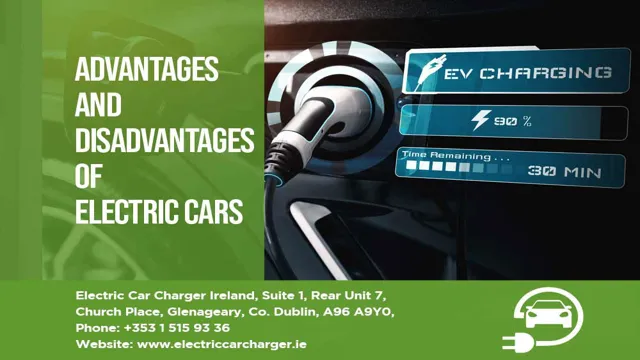
Availability of Charging Stations
When it comes to electric cars, a big concern for many people is the limited range. This means that drivers can only go a certain distance on a single charge before needing to recharge their battery. While some newer electric vehicles can go up to 300 miles on a single charge, that’s not the case for all models.
This can make people hesitant to make the switch to an electric car. Another issue is the availability of charging stations. Depending on where you live, it may be difficult to find a charging station when you need one.
This can be especially problematic during long road trips where you need to drive for several hours at a time. However, the good news is that more and more charging stations are being built every day. In fact, many cities now have charging stations throughout their downtown areas.
Plus, many businesses are starting to install charging stations in their parking lots as a way to attract eco-conscious customers. With the continued growth of electric cars, we can expect to see even more charging stations popping up in the near future.
Higher Initial Costs
When it comes to electric cars, one of the major disadvantages is the higher initial cost of the battery. While the cost of manufacturing batteries has decreased significantly in recent years, electric car batteries are still more expensive than traditional car batteries. This is due to the sophisticated technology that is required to produce high-quality batteries that can last for years and provide sufficient power to drive the car.
The higher initial cost may deter some people from purchasing an electric car, but it is important to consider the long-term savings that come with owning one. Electric cars are much cheaper to maintain and operate than traditional cars, so the overall cost of ownership may actually be lower in the long run. Additionally, many state and federal programs offer incentives and tax credits to help offset the higher cost of electric cars and make them more affordable for consumers.
So while the higher initial cost of electric car batteries may be a disadvantage, it should not deter anyone from considering the many benefits of owning an electric car.
Battery Replacement Costs
If you’re considering an electric vehicle, be prepared for higher initial costs, including potential battery replacement costs. The battery pack is a significant component of an electric vehicle, and although they generally have a longer lifespan than traditional car batteries, they will eventually need to be replaced. The cost of a new battery pack can range from several thousand to tens of thousands of dollars, depending on the vehicle’s make and model.
However, it’s important to note that battery technology is constantly improving, and prices are likely to decrease over time. Additionally, many manufacturers offer warranties for their battery packs, providing some peace of mind for potential replacement costs. Ultimately, the benefits of driving an electric vehicle usually outweigh the potential costs, including long-term savings on fuel and maintenance expenses.
Limited Model Options
When it comes to purchasing a new vehicle, a limited range of model options can be a downside for some buyers. This is because they may have specific features or preferences in mind that are not available in the limited selection. While some automakers offer a wider range of models, others only have a few to choose from.
Additionally, higher initial costs can also be a concern for buyers when selecting a specific model. While some may argue that the added cost is worth it, others may find it difficult to justify the price tag. However, it’s important to keep in mind that sometimes these higher initial costs can ultimately be offset by factors such as better fuel efficiency or long-term durability.
Ultimately, it’s important for buyers to carefully consider their options and weigh the pros and cons before making a final decision on a limited model.
Lower Resale Value
When it comes to purchasing a vehicle, one of the biggest considerations is often the cost. However, while opting for a luxury car may seem like a great idea initially, it’s important to keep in mind that higher initial costs can lead to lower resale value in the long run. Luxury cars typically have a higher price tag due to their advanced technology, top-of-the-line features, and luxurious finishes.
However, as soon as you drive your new luxury car off the lot, it begins to depreciate in value. This depreciation continues over time, meaning that when it comes time to sell your car, you may not get as much money back as you initially invested. This is especially true if you opt for higher-end luxury brands, as these cars tend to depreciate more quickly than their more affordable counterparts.
Before making a commitment to a luxury car, it’s important to consider not just the initial cost but also the potential long-term costs associated with resale value.
Environmental Concerns
Many individuals are now turning to electric cars as a greener and more sustainable alternative to traditional combustion engine vehicles. However, there are also some disadvantages to consider, specifically when it comes to the battery. While electric car batteries have improved significantly in recent years, they still have some drawbacks.
The first is the limited range of the battery, which means drivers must plan their journeys carefully and ensure they can find charging points along the way. In addition, the batteries can take several hours to charge fully, which can be inconvenient for those on the go. The batteries are also quite heavy, which can affect the car’s overall performance, and they may require special disposal methods as they contain toxic materials.
Overall, while electric car batteries have many benefits, it is important to consider these disadvantages before making a purchase decision.
Raw Material Extraction Impact
When we talk about the impact industrial activities have on the environment, we often overlook one of the most critical parts of the process: the extraction of raw materials. This phase involves mining, drilling, and other destructive practices that leave scars on the earth’s surface, contribute to soil erosion and deforestation, and disrupt the balance of delicate ecosystems. The environmental concerns surrounding raw material extraction are manifold, ranging from greenhouse gas emissions to water contamination and air pollution.
Moreover, the extraction of non-renewable resources such as oil, coal, and natural gas contributes significantly to climate change, which affects the planet’s health and human lives alike. It’s essential for mining and extraction industries to work with sustainability in mind, using renewable energy sources and improving safety measures to reduce the environmental impact of their activities. Otherwise, the negative effects of raw material extraction will continue to reverberate and magnify over time, posing a significant threat to our planet’s future.
Battery Disposal Challenges
Battery disposal is a significant environmental concern, given the rise in e-waste and the prevalence of batteries in everyday life. The improper disposal of batteries can lead to toxic chemicals seeping into the ground and contaminating the environment. Many batteries contain heavy metals like lead, mercury, and cadmium, which are known to be harmful to human health and the environment.
Disposing of batteries in regular waste is not recommended, and they need to go to designated recycling centers. However, the accessibility of designated battery recycling centers remains a significant challenge, particularly in remote or low-income areas. This poses a risk of batteries being carelessly disposed of, causing environmental damage and health risks.
It’s essential to educate the public about the importance of proper battery disposal and establish accessible and affordable recycling options to ensure the protection of our environment and well-being.
Safety Risks
One of the disadvantages of electric car batteries is the potential safety risks that they pose. Lithium-ion batteries, which are commonly used in electric cars, can catch fire or even explode if they are damaged or not properly maintained. This is because they contain a flammable electrolyte solution that can ignite if it comes into contact with air.
While incidents are rare, they can be dangerous and even deadly. It is important to handle electric car batteries with caution and to have them serviced regularly by a professional technician. It is also important to be aware of any potential recalls or safety issues related to the specific make and model of your electric car.
Despite these risks, it is important to remember that electric cars are still safer than traditional gas-powered cars in other ways, such as their low center of gravity and reduced risk of carbon monoxide poisoning.
Conclusion
In the race towards a cleaner and greener transportation future, electric cars have certainly gained a significant head start. However, like most things in life, there are trade-offs to be made. One of the biggest disadvantages of electric car batteries is their limited range and the time required to recharge them.
While technological advancements are being made to address this issue, the road ahead is still long. But let’s not lose sight of the bigger picture – electric cars have the power to revolutionize the automotive industry and drastically reduce our carbon footprint. So, while there may be some disadvantages to electric car batteries, the potential benefits are well worth the effort and investment.
“
FAQs
What are the disadvantages of electric car batteries compared to traditional gasoline engines?
Electric car batteries can take longer to charge than filling a gas tank, and the overall range of electric cars is often limited compared to gas-powered cars.
How long do electric car batteries last before they need to be replaced?
The lifespan of an electric car battery can vary depending on factors such as usage, temperature, and maintenance, but they generally last between 8-10 years.
Can electric car batteries be recycled?
Yes, the materials in electric car batteries such as lithium and cobalt can be recycled. However, the recycling process can be expensive and have its own environmental impact.
How do extreme temperatures affect electric car batteries?
Extreme temperatures, both hot and cold, can affect an electric car battery’s performance and reduce its overall lifespan. Proper battery management, such as carefully monitoring the car’s temperature and reducing usage during extreme weather, can help mitigate these effects.
